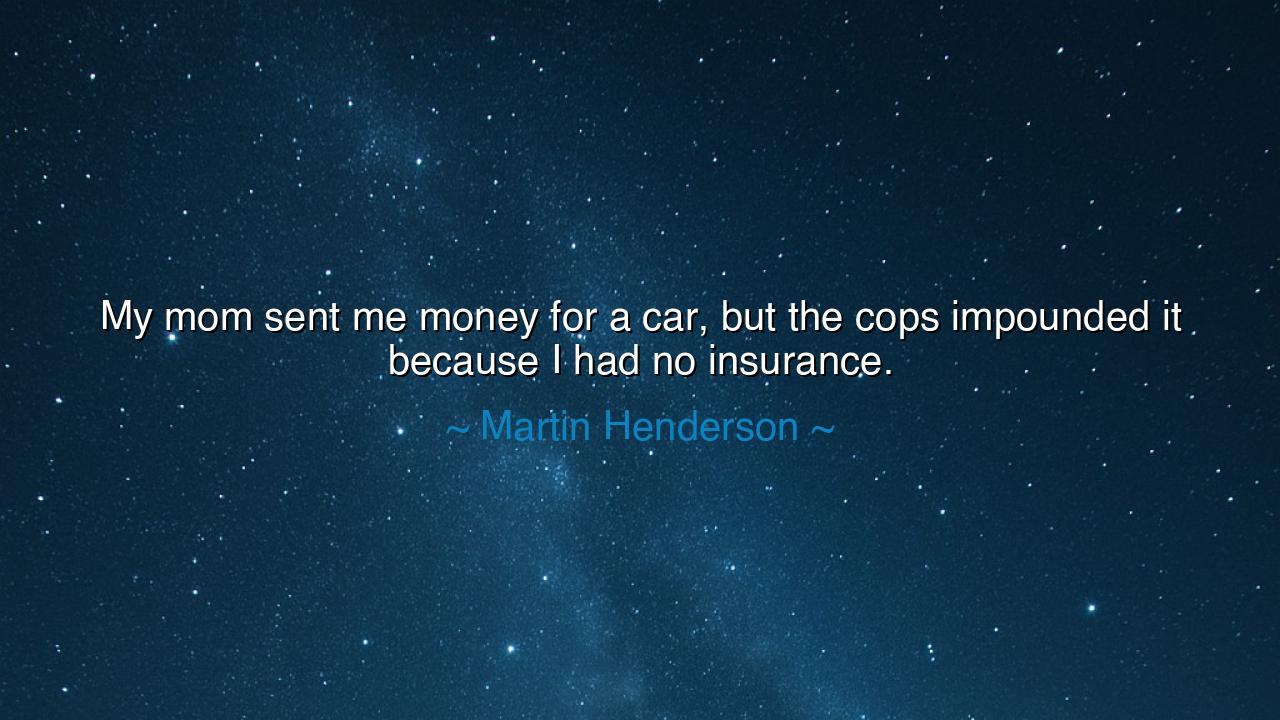
My mom sent me money for a car, but the cops impounded it because






When Martin Henderson said, “My mom sent me money for a car, but the cops impounded it because I had no insurance,” his words spoke with the bittersweet honesty of youth — the raw lessons of independence, responsibility, and imperfection. Beneath the humor and regret lies an eternal story: the journey from dependence to accountability, from being cared for to learning what it means to care for oneself. It is a confession not of failure, but of growth — the moment when life itself becomes the teacher, and experience delivers wisdom no classroom can provide.
The ancients would have recognized this moment as part of the rite of passage, that sacred time when a young person learns through error the weight of their own choices. Henderson’s words echo the same rhythm found in the lives of heroes and common souls alike: the misstep that teaches, the stumble that steadies the future stride. His mother’s generosity — the gift of the car — symbolizes trust, the belief of one generation in the readiness of the next. But trust, like freedom, demands responsibility. To lose the car was not merely to lose a vehicle; it was to gain understanding, to feel the sting of consequence that tempers youthful eagerness into maturity.
In the story, we hear not bitterness, but reflection. There is humor in it — the kind of humor born from survival, from looking back on one’s foolishness and smiling at how it shaped them. To have “no insurance” is not just a literal oversight; it becomes a metaphor for unpreparedness, the youthful illusion that good intentions alone will protect us from the world’s demands. Henderson’s experience teaches what all must eventually learn: that effort without foresight is fragile, and that even the simplest responsibilities — like a document, a payment, a promise — are the scaffolding that holds up our freedom.
History offers countless mirrors of this lesson. Think of Alexander the Great, who in his youth, filled with fire and brilliance, tamed the great horse Bucephalus after others had failed. Yet his early victories led him to believe that the world could be conquered by passion alone — until age and hardship taught him that conquest without wisdom leads to collapse. Like Henderson, he learned that the gift of opportunity requires the discipline to sustain it. What begins in triumph must be maintained through understanding.
There is also the quiet figure of the mother in Henderson’s quote — the ever-present symbol of faith and sacrifice. She sent money, perhaps out of love and hope, wanting her child to move freely in the world. Her act represents the eternal parent’s dream: to empower their child to live independently, to drive their own path. And though her son faltered, her gift still fulfilled its purpose — for it brought him not just mobility, but maturity. Often, the truest lessons of love are not found in success, but in how one recovers from a mistake born of trust.
The emotional power of this quote lies in its humility. There is no arrogance, no defense — only the honesty of one who remembers being young and foolish, and who has learned to laugh without forgetting the lesson. It is this humility that transforms a small personal story into a universal truth: that growth often arrives disguised as loss, and that the pain of a mistake, when acknowledged, becomes a seed of wisdom.
So let the teaching be this: Honor your mistakes, for they are the currency of learning. Accept responsibility not as punishment, but as initiation into the deeper art of living. When someone gives you a gift — a chance, a job, a trust — guard it not with fear, but with awareness. For the world, like that impounded car, will always demand proof of readiness. But even when we fail, as we all must, let gratitude remain — gratitude for those who believed in us, and for the lessons that turn our missteps into mastery.
Thus, in Martin Henderson’s story, the car becomes more than a possession — it becomes a symbol of freedom gained, lost, and finally understood. The mother’s gift, the son’s mistake, and the world’s correction form a timeless pattern: love gives, inexperience forgets, and life restores balance. It is through this cycle that we grow — wiser, humbler, and better prepared for the next road we are called to travel.






AAdministratorAdministrator
Welcome, honored guests. Please leave a comment, we will respond soon